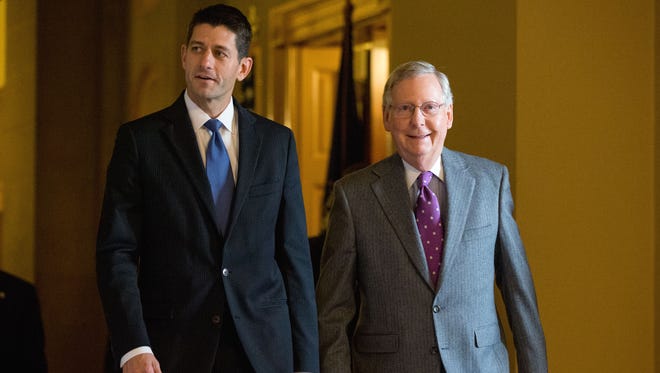Trump has Congress if he can keep it: Michael Medved
Republicans have meaningful margins and stand to gain in 2018.

Americans of every outlook can agree on President-elect Donald Trump's status as a singular political personality, but even some of his most ardent supporters fail to grasp the singular nature of the opportunity that awaits him. Of the last eleven presidents, Trump is the sixth Republican, but he's the only one of that group to assume power with uncontested Republican control of both houses of Congress.
Not since Dwight Eisenhower took the oath of office 64 years ago has an incoming GOP president been able to count on Republican majorities in both the Senate and the House.
Richard Nixon won two terms in the White House, including a 49-state blow-out in 1972, but he never controlled either house of Congress. Ronald Reagan also earned epic landslides and eight years in office, but the House of Representatives remained in Democratic hands, forcing constant compromise with the wily speaker, Tip O'Neill.
George W. Bush came closest to equaling Trump's Congressional edge, but Republican Senate losses in the breathlessly close balloting of 2000 left the upper house tied, 50-50. This led to an awkward power-sharing arrangement which empowered both parties to lead crucial committees. After four months of frustration, Vermont senator James Jeffords broke the tie in his own way, abandoning the GOP to cross the aisle and handing the Democrats the majority they coveted.
3 Democratic delusions: Michael Medved
Trump, despite losing the popular vote by a margin of nearly three million, will face no similar challenges in dealing with the Republican-led Congress. Despite the distraction of outrageous tweets and some eccentric appointments, the president-elect's transition-time maneuvers have shored up his standing with the Congressional wing of his party. Mike Pence, the vice president that Trump chose, served six terms in the House and formed a fast friendship with future speaker Paul Ryan. Trump has also stocked his cabinet with some of the most influential Republicans on Capitol Hill, including Senator Jeff Sessions as attorney general and Congressman Tom Price as secretary of Health and Human Services. The new president also selected Elaine Chao, wife of Senate Majority Leader Mitch McConnell, R-Ky., to become secretary of Transportation for Team Trump. It would be difficult to imagine more intimate, or organic, lines of communication between the Cabinet and Senate leadership.
The new president's Congressional edge hardly guarantees a successful presidency: The Trump Train could go off the rails at any time, given the self-absorbed and impulsive nature of the engineer at the throttle. But Constitutional checks and balances should assist savvy pros like Ryan and McConnell in applying the brakes, as necessary. Trump may make progress in his well-publicized efforts to drain the swamp but that doesn't mean paving over the fetid wetlands with a one-way superhighway to Mt. Rushmore.
What Trump could learn from Nixon: Column
POLICING THE USA: A look at race, justice, media
If Congressional leadership can collaborate with the White House in an effort to put points on the board with quick, showy victories (Obamacare reform, confirming a new conservative for the court, a corporate tax cut), then Republicans will celebrate at both ends of Pennsylvania Avenue.
Such triumphs largely eluded Eisenhower, despite his landslide victory of 1952 and his tenuous Congressional majorities. Republicans commanded margins of just one vote in the Senate and eight in the House, compared to President Trump's relatively luxurious 47-vote bulge in the House. When it comes to the Senate, GOP planners look forward to 2018, when they all defend only eight seats, nearly all of them in reliably red states. The Democrats, by contrast, seek to protect 25 seats, ten of them in states Trump carriedthis year.
Republicans of the Ike era succumbed to intra-party squabbles surrounding Senator Joe McCarthy's anti-Communist excesses, and lost their short-lived Congressional majorities in 1954, before wandering in the wilderness of minority status for the next quarter century. By contrast, the GOP position in 2016 looks more secure and more promising.
At the conclusion of the Constitutional Convention, a group of eager citizens asked Benjamin Franklin what sort of government the delegates had established. "A republic," he famously replied, "if you can keep it." In the same vein, the sage of Philadelphia might advise the president-elect about what sort of partisan majority Trump should expect to lead. Republican, Franklin would say, if you can keep it.
Michael Medved, author of the new book The American Miracle: Divine Providence and the Rise of the Republic, is a syndicated talk radio host and member of the USA TODAY Board of Contributors.
You can read diverse opinions from our Board of Contributors and other writers on the Opinion front page, on Twitter @USATOpinion and in our daily Opinion newsletter. To submit a letter, comment or column, check our submission guidelines.